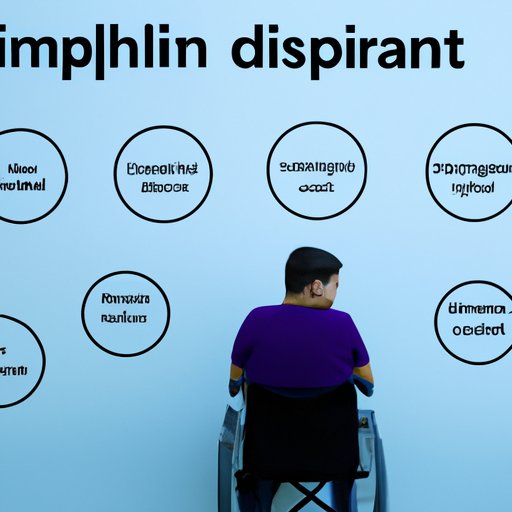Introduction
Mental health is an important part of overall wellbeing, and many people struggle with various issues related to mental health. Taking time off from work or school can be essential in order to properly address these issues. Fortunately, there are various options available, including short-term disability for mental health.
Overview of Short-Term Disability for Mental Health
Short-term disability (STD) is a type of insurance plan that provides financial assistance to individuals who are unable to work due to a physical or mental illness. These plans typically cover a period of between three and six months and are designed to help individuals bridge the gap between when they become disabled and when they are able to return to work. In some cases, these plans also provide coverage for mental health conditions.
Benefits of Taking Short-Term Disability for Mental Health
Taking short-term disability for mental health can provide a number of benefits. First and foremost, it can provide financial assistance for individuals who are unable to work due to a mental health issue. This can help to alleviate the stress of not being able to work while still allowing individuals to focus on their recovery. Additionally, taking short-term disability for mental health can provide peace of mind knowing that if the condition worsens, there is a safety net in place.
Understanding the Process of Applying for Short-Term Disability for Mental Health
The process of applying for short-term disability for mental health varies depending on the specific plan. Generally speaking, the process involves submitting an application that includes medical records and other relevant information. Additionally, most plans require the individual to be evaluated by a doctor or qualified mental health professional in order to ensure that the condition meets the criteria for coverage.
Once the application is submitted, it typically takes several weeks for the insurance company to review it and make a decision. If the application is approved, the individual will begin receiving benefits within a few weeks.
Examining the Potential Challenges of Obtaining Short-Term Disability for Mental Health
Unfortunately, obtaining short-term disability for mental health can present some challenges. For example, it can be difficult to obtain the necessary documentation to prove that the condition meets the criteria for coverage. Additionally, many insurance companies have strict guidelines regarding mental health conditions, which can lead to denials even if the condition is legitimate.
Strategies to Overcome These Challenges
Fortunately, there are strategies that can be used to overcome these challenges. One of the most important is to carefully review the policy before submitting the application to ensure that all of the necessary documentation is included. Additionally, it can be helpful to connect with a qualified mental health professional who can provide an objective assessment of the condition and provide evidence to support the application.
Investigating How to Access Support for Short-Term Disability for Mental Health
In addition to connecting with a qualified mental health professional, there are other resources available to individuals who are seeking short-term disability for mental health. For example, many organizations offer free or low-cost services that can provide assistance with the application process. Additionally, many employers offer employee assistance programs that can provide advice and support throughout the process.
Comparing Different Types of Short-Term Disability for Mental Health
When considering short-term disability for mental health, it is important to understand the different types of plans available. The two most common types of plans are employer-sponsored plans and individually purchased plans. Employer-sponsored plans typically provide more comprehensive coverage, but may require employees to pay premiums. Individually purchased plans are usually less expensive, but may not provide as much coverage.
It is also important to understand the advantages and disadvantages of each type of plan. For example, employer-sponsored plans may provide more comprehensive coverage, but may also require more paperwork and a longer approval process. Conversely, individually purchased plans may be easier to apply for, but may not provide as much coverage.
Conclusion
In conclusion, taking short-term disability for mental health can be beneficial for individuals who are struggling with a mental health issue. It is important to understand the process of applying for coverage, as well as the potential challenges. Additionally, there are resources available to assist with the process, such as qualified mental health professionals and employee assistance programs. Finally, it is important to understand the different types of plans available and their respective advantages and disadvantages.
If you are considering taking short-term disability for mental health, it is important to seek out the help you need. There are a variety of resources available to assist with the process and provide support along the way. Don’t hesitate to reach out and take advantage of the many resources available.
(Note: Is this article not meeting your expectations? Do you have knowledge or insights to share? Unlock new opportunities and expand your reach by joining our authors team. Click Registration to join us and share your expertise with our readers.)
